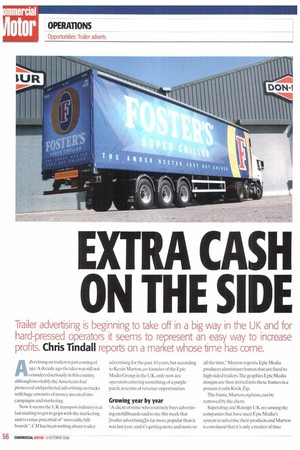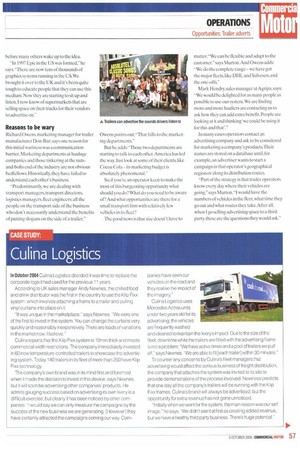EXTRA CASH ON THE SIDE
Page 56

Page 57

If you've noticed an error in this article please click here to report it so we can fix it.
Trailer advertising is beginning to take off in a big way in the UK and for
hard-pressed operators it seems to represent an easy way to increase
profits. Chris Tindall reports on a market whose time has come.
Advertising on trailers is just coming of age.A decade ago the idea was still not considered seriously in this country, although inevitably the Americans had pioneered and perfected advertising on trucks with huge amounts of money invested into campaigns and marketing.
Now it seems the UK transport industry is at last starting to get to grips with the marketing and revenue potential of "moveable billboards". CM has been writing about trailer advertising for the past 10 years, but according to Kevin Murton, co-founder of the Epic Media Group in the UK. only now are operators entering something of a purple patch, in terms of revenue opportunities.
Growing year by year "A client of mine who routinely buys advertising on billboards said to me this week that [trailer advertising] is far more popular than it was last year, and it's getting more and more so all the time," Murton reports. Epic Media produces aluminium frames that are fixed to high-sided trailers.The graphics Epic Media designs are then slotted into these frames in a process it calls Kwik Zip.
The frame, Murton explains, can be removed by the client.
Superdrug and Raleigh UK are among the companies that have used Epic Media's system to advertise their products and Murton is convinced that it's only a matter of time before many others wake up to the idea.
-In 1997 Epic in the US was formed," he says.-There are now tens of thousands of graphics systems running in the US.We brought it over to the UK and it's been quite tough to educate people that they can use this medium. Now they are starting to sit up and listen.1 now know of supermarkets that are selling space on their trucks for their vendors to advertise on."
Reasons to be wary
Richard Owens, marketing manager for trailer manufacturer Don-Bur, says one reason for this initial wariness was a communication barrier. Marketing departments at haulage companies and those tinkering at the nutsand-bolts end of the industry are not obvious bedfellows. Historically, they have failed to understand each other's business.
"Predominantly, we are dealing with transport managers, transport directors, logistics managers, fleet engineers; all the people on the transport side of the business who don't necessarily understand the benefits of putting slogans on the side of a trailer," Owens points out."That falls to the marketing departments."
But he adds:"Those two departments are starting to talk to each other. America has led the way. Just look at some of their clients, like Cocoa Cola — its marketing budget is absolutely phenomenal."
So, if you're an operator keen to make the most of this burgeoning opportunity what should vou do? What do you need to be aware of? And what opportunities are there for a small transport firm with relatively few vehicles in its fleet?
The good news is that size doesn't have to matter."We can be flexible and adapt to the customer," says Murton.And Owens adds: "We do the complete range —we have got the major fleets, like DHL and Salvesen, and the one-offs."
Mark Hendry, sales manager at Agripa, says: "We would be delighted for as many people as possible to use our system. We are finding more and more hauliers are contacting us to ask how they can add extra benefit. People are looking at it and thinking 'we could be using it for this and that'."
In many cases operators contact an advertising company and ask to be considered for marketing a company's products.Their names are stored on a database until.for example, an advertiser wants to start a campaign in that operator's geographical region or along its distribution routes.
"Part of the strategy is that trailer operators know everyday where their vehicles are going," says Murton. "I would have the numbers of vehicles in the fleet, what time they go out and what routes they take.After all, when I go selling advertising space to a third party, these are the questions they would ask."
























































































































































































